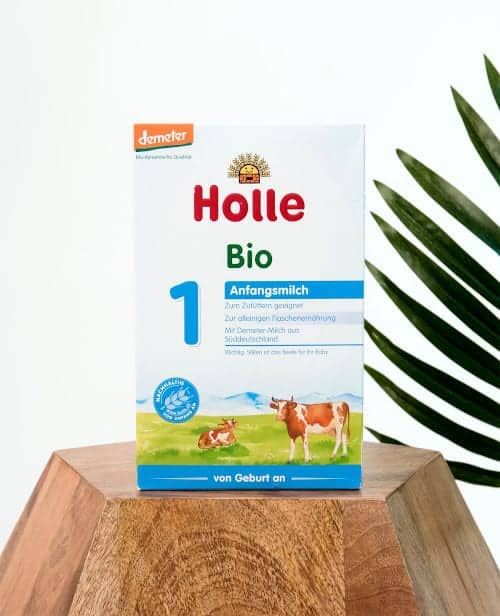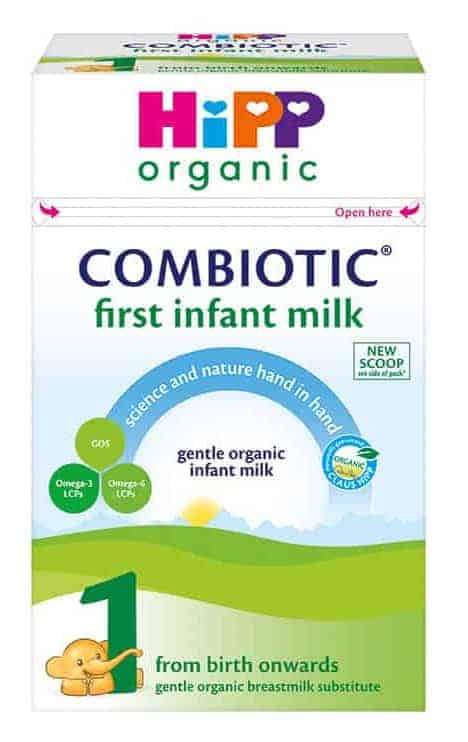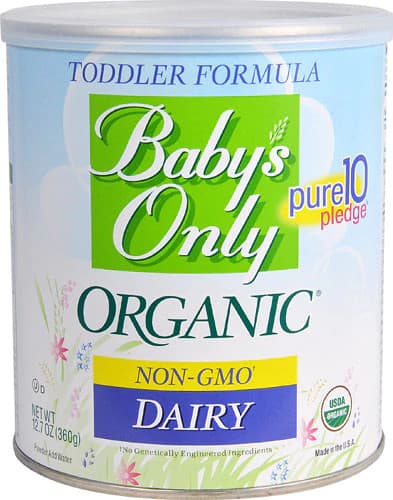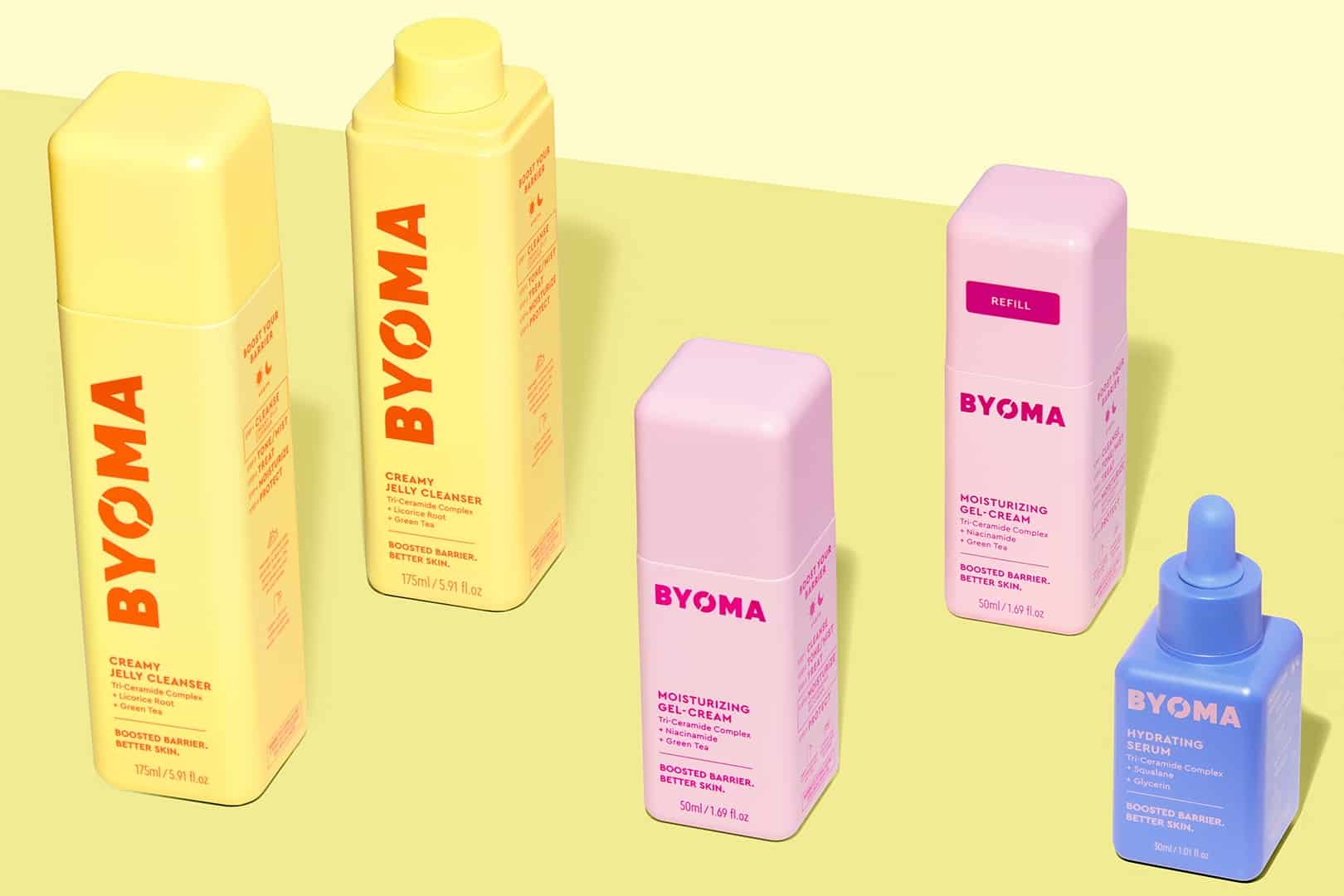The Eco Mom’s Guide to Safe, Organic Baby Formula

While many moms love the idea of breastfeeding, sometimes it just doesn’t work out.
There’s a lot of stigma around the use of formula which in turn leads to many moms delaying the switch to it.
Whether you’re struggling to breastfeed, have a medical issue that makes it impossible or it’s simply a personal choice, it’s totally okay. This is a no judgement zone.
And then it comes to actually choosing the best organic baby formula. Where do you begin?
Today we’ll be answering questions like:
- What ingredients to avoid in baby formula
- The different types of formula available
- Why many parents are choosing European formulas for their infants.
The Different Types of Baby Formula Available.
Cow’s milk formula: The standard and most common type of formula that’s widely available. Most babies will be fine with cow’s milk formula but some with intolerance to milk proteins might need an alternative.
Goat’s milk formula: This has kind of blown up lately and is all the rage in certain circles. Babies allergic to cow’s milk formula likely can’t drink goat’s milk formula either.
Soy formula: Vegan formula that is recommended by pediatricians in rare circumstances where babies can’t tolerate any dairy formula.
However, please be aware that soy formula is so nutritionally different from human milk that some countries like New Zealand have made it available only by prescription.
Hypoallergenic formula: These formulas are typically made from cow’s milk, but the proteins are broken down so that they’re easier for babies to digest.

Unfortunately, Some Companies Are Trying to Trick Us.
Not all organic baby formula is trustworthy. In fact, many of the organic baby formulas you’ll find on store shelves are actually full of ingredients that really shouldn’t be there.
Europe bans a lot of ingredients that the USDA allows, and this has lead to a huge uptick in parents buying organic European formulas online.
Charlotte Vallaeys, former director of the Farm and Food policy at the Cornucopia Institute and current Senior Analyst at the Consumer Safety and Sustainability Program at Consumers Union does an excellent analysis of US formulas vs. European formulas.
A list of harmful ingredients in some formulas that should be avoided:
- Carrageenan
- Processed refined sugars (Corn syrup, maltodextrin, brown rice syrup with detectable levels of arsensic)
- Palm oil
- Synthetic DHA and ARA extracted with hexane
- Synthetic Preservatives (Ascorbyl palmitate and beta-carotene)
- Synthetic nutrients (lutein, lycopene, nucleotides, taurine, L-carnitine, L-methionine)
Many of the ingredients above are banned in the European Union, which is a big reason why more and more parents are buying European-sourced formulas.
There’s really so such thing as a perfect organic baby formula. Even the European formulas have some ingredients that aren’t entirely wholesome, but it’s still far better than many of the American brands available.
That’s not to say that all American formulas are bad. And it should be noted that most European formulas are not cleared by the FDA in the US, and you should always check with your pediatrician before switching formulas.
The Best Organic Baby Formulas.

Holle is a German brand that makes one of the two best and trustworthy organic baby formulas.
You’ll notice that the writing on the box is all in German. That’s because it’s all imported straight from Germany, and is not widely available in North America. However, there are a few special stores online where you can find it.
Some quick facts on Holle:
- Made with organic skimmed milk made from Demeter-certified farms. Demeter is the top-tier certification for bio farms .
- Certified organic to European standards, which are more strict than the USA.
- GMO-free.
- No artificial preservatives, chemicals, flavors or colors.
Even though Holle is one of the best, it still contains maltodextrin, but at least it’s an organic maltodextrin.
That aside, this is a top quality organic formula and one of the most popular available.
HiPP

HiPP is the other popular organic baby formula on the market.
They make 3 different versions which are available, each with slight variations. The reason for this is that each country they’re available in has different regulations.
All of them are a great choice, but are different in some ways.
The major differences are:
- The German version is the only one that contains probiotics.
- The UK version doesn’t contain whey.
- The UK & Dutch versions don’t contain starch.
- The Dutch version comes in a resealable can instead of a box.
It really comes down to your personal preference. I’d personally go with the German version because it contains the probiotic, but any of them are a great choice.
Baby’s Only Toddler Formula

If an American-made formula is more up your alley, Baby’s Only Organic Toddler Formula is one of the safe ones available.
There are some concerns about this formula because it uses brown rice syrup for the sweetener. The brand has developed a filtration system that removes any arsenic to undetectable levels, but if that still worries you, they make whey version that uses lactose for the sweetener.
Some quick facts on Baby’s Only:
- Made in the USA
- No palm oil.
- It’s technically a “toddler” formula to avoid the need for clinical trials and extensive testing. While many parents choose this formula for their infants, please check with your pediatrician first.
Why You Can’t Just Give Your Child Cow’s Milk.
You may be wondering why you should feed baby formula to your baby rather than less expensive regular cow’s milk.
There are a few reasons for this. According to the Committee on Nutrition of the American Academy of Pediatrics, cow’s milk is not appropriate for children under 1 year of age.
First of all, regular cow’s milk does not have much iron, which can lead to iron deficiency.
Second of all, because of the way cow’s milk is processed, it can lead to potential intestinal blood loss in infants. On top of this, the levels of sodium and protein in regular cow’s milk are much higher than recommended for children.
Finally, cow’s milk is simply harder for infants to digest.
Food Allergies and Formula.
If your baby has problems with his or her formula, including allergies or lactose intolerance, it’s very important to choose a formula that will work well with their digestive systems.
You might want to talk to your baby’s pediatrician before changing formulas, as it’s possible your child has undiagnosed allergies.
Telltale signs of a formula intolerance or allergy include excessive fussiness or crying and obvious discomfort. Your baby might seem excessively gassy or “colicky.” Other signs of intolerance include diarrhea or excessively hard stools, spitting up, vomiting, poor weight gain.
You might consider talking to you and your partner’s parents to see if either of you had any specific intolerance or allergies to specific types of baby formula.
If your baby is showing any signs of an allergic reaction, be sure to consult with your pediatrician for advice.
A Friendly Reminder: Please Check with Your Pediatrician.
Before starting with (or switching to) any formula, please check with your pediatrician first. Every child has different nutritional needs, and your doctor will know what’s best for your little one.
2 Comments
-
Kelly A Renkiewicz
Do you have any Vegan formula recommendations?





Ashley M
In case you need another source, please update your information, other mamas rely on trusted information.
https://www.washingtonpost.com/business/2021/02/04/toxic-metals-baby-food/